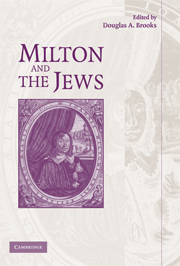Book contents
- Frontmatter
- Contents
- Acknowledgments
- Contributors
- 1 Introduction: Milton and the Jews: “A Project never so seasonable, and necessary, as now!”
- 2 England, Israel, and the Jews in Milton's Prose, 1649–1660
- 3 Milton's Peculiar Nation
- 4 Making Use of the Jews: Milton and Philo-Semitism
- 5 Milton and Solomonic Education
- 6 T. S. Eliot, Anti-Semitism, and the Milton Controversy
- 7 A Metaphorical Jew: The Carnal, the Literal, and the Miltonic
- 8 “The people of Asia and with them the Jews”: Israel, Asia, and England in Milton's Writings
- 9 Returning to Egypt: “The Jew,” “the Turk,” and the English Republic
- Select Bibliography
- Index
4 - Making Use of the Jews: Milton and Philo-Semitism
Published online by Cambridge University Press: 02 July 2009
- Frontmatter
- Contents
- Acknowledgments
- Contributors
- 1 Introduction: Milton and the Jews: “A Project never so seasonable, and necessary, as now!”
- 2 England, Israel, and the Jews in Milton's Prose, 1649–1660
- 3 Milton's Peculiar Nation
- 4 Making Use of the Jews: Milton and Philo-Semitism
- 5 Milton and Solomonic Education
- 6 T. S. Eliot, Anti-Semitism, and the Milton Controversy
- 7 A Metaphorical Jew: The Carnal, the Literal, and the Miltonic
- 8 “The people of Asia and with them the Jews”: Israel, Asia, and England in Milton's Writings
- 9 Returning to Egypt: “The Jew,” “the Turk,” and the English Republic
- Select Bibliography
- Index
Summary
Und sie lobten nicht Gott,
der, so hörten sie, alles dies wollte,
der, so hörten sie, alles dies wußte.
Paul CelanThis essay examines John Milton as a point of intersection between philo-Semitism and anti-Semitism in seventeenth-century England. It takes new biographical details – centring in Milton's usury, the philo-Semitism of his close acquaintance, the anti-Semitism of his brother-in-law – and relates them to questions of typology, especially the claiming techniques whereby English Christian literature seeks to make its own the Hebrew God. I argue that early modern complaints about the perceived instrumentalism of Jewish law and ceremony find their own answer in the instrumentalizing of Jews and Jewish culture, even where the latter eventuates in what seem strikingly different results. In sum, there is more similarity than at first appears between anti-Semitic proposals “For raiseing monyes out of the Jewes estates in Your Majesties Dominions” and the reconciliations of “Jew and Gentile” in more philo-Semitic discourse. The literary consequences of this convergence invite exploration, with special reference to Samson Agonistes and Paradise Regain'd, and to Milton's Psalm translations as published in 1673.
Milton's generosity to his in-laws the Powells included little measure of fellow-feeling. In the spring of 1647 he complains to the Florentine nobleman Carlo Dati about the upheavals in his nation and in his own household, with the affliction of the Powells' descent on him in London seeming the more pressing evil.
- Type
- Chapter
- Information
- Milton and the Jews , pp. 57 - 82Publisher: Cambridge University PressPrint publication year: 2008
- 1
- Cited by



